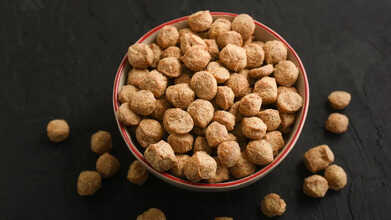- Health Conditions A-Z
- Health & Wellness
- Nutrition
- Fitness
- Health News
- Ayurveda
- Videos
- Medicine A-Z
- Parenting
- Web Stories
Eating A Banana At 11 Am Could Protect Your Heart And Lower Cholesterol: British Heart Foundation Reveals How

(Credit- Canva)
What you eat, when you wake up, how much you exercise and how good your stress levels are. These are a few of the key pillars of a healthy heart and healthy living. While there are other aspects as well that one needs to pay attention to, these can have a direct impact on your heart.
While there are many health tips and food finds that can help you keep your health steady, British Heart Foundation has a simple addition to that.
What Is A Heart Healthy Mid Day Snack?
A healthy diet is crucial for managing your weight, blood pressure, and cholesterol. A 2014 report from the British Heart Foundation highlighted how a simple dietary change could significantly benefit heart health. The report specifically suggested swapping your mid-morning biscuit for a piece of fruit.
According to the report, the best choice for this 11 AM snack is a banana. Bananas are low in fat and a great source of fiber. This simple swap helps you work toward your goal of consuming at least five portions of fruit and vegetables a day, a practice recommended by the World Cancer Research Fund.
Regularly including this fruit in your diet can help with weight management and keep your cholesterol and blood pressure at healthy levels.
How Does Banana Benefit Your Heart?
Bananas are a fantastic alternative because they are low in fat and rich in fiber. They provide a steady energy boost without the sharp sugar spike of a biscuit, and their resistant starch helps you feel full and satisfied. This small change helps you work toward your goal of consuming five portions of fruit and vegetables a day.
Blood Pressure Management
Bananas are packed with potassium, a mineral vital for regulating blood pressure. Increasing your potassium intake can help your body get rid of excess sodium and relax your blood vessels, which may be more effective than just cutting back on salt.
Lower Cholesterol
The soluble fiber in bananas helps reduce cholesterol absorption in your blood.
Rich in Nutrients
Bananas are packed with important nutrients like Vitamin B6, Vitamin C, and manganese. These help keep your bones strong, improve digestion, and manage your blood sugar.
How Does Your Diet Impact Your Heart?
Keeping your heart healthy and your weight in check is crucial for preventing serious health problems. High cholesterol can cause a sticky buildup in your arteries, which forces your heart to work harder and raises your risk of a heart attack or stroke. Similarly, high blood pressure puts extra strain on your organs and blood vessels. Being overweight can also lead to major issues like heart disease and diabetes.
How to Eat Bananas in a Healthful Way
A small change in what you eat can make a big difference for your heart. The British Heart Foundation says that making smart food choices is key to a strong heart. Here are some simple ways to include bananas in your daily routine:
In smoothies and shakes
Use a banana as a natural sweetener to make your smoothies thick and creamy. Just blend a frozen banana with some spinach, a little protein powder, and your choice of milk or water for a healthy drink.
In oatmeal or yogurt
Add sliced bananas to your breakfast bowl. This gives you a natural sweetness so you don't need to add sugar, and the fiber will keep you feeling full.
As a healthy baking substitute
You can swap out some of the sugar, butter, or oil in recipes for muffins, bread, or pancakes with mashed bananas. This makes your baked goods healthier without sacrificing flavor.
Create healthy frozen desserts
For a treat, mash or blend frozen bananas to make a "nice cream" that tastes like soft-serve ice cream but is completely dairy-free and has no added sugar. You can also freeze banana slices and dip them in dark chocolate for a quick and easy snack.
Think Soya Chunks Are Healthy? Gut Specialist Warns They May Harm Your Gut

Credits: Canva
In recent years, vegetarian diets have grown in popularity as more people turn to plant-based options to replace animal protein. Since meat is a key source of protein, vegetarians often look to alternatives such as soya chunks, which are widely marketed as high-protein, low-fat substitutes.
Soy has always been a controversial topic in nutrition. Research suggests it may offer benefits like better heart health, improved blood sugar control, reduced menopause symptoms, and possibly lower cancer risk. At the same time, many experts have raised concerns about its safety and long-term impact.
What Are Soya Chunks?Soya chunks, also known as textured vegetable protein, are made from defatted soy flour. Their meaty texture and protein content make them a popular choice in curries, stir-fries, soups, and even as a filling in tacos and burgers. For many vegetarians and vegans, they have become a convenient source of protein.
Are Soya Chunks Good for Gut Health?
According to gut and hormone health expert Tanisha Bawa, the ‘high-protein’ tag attached to soy products such as soya nuggets, soya chaap, and even soy milk is misleading. In a recent video, she warned that these products may actually be worse than junk food.“These soy nuggets are industrially processed and often contain 80 to 90 percent refined flour,” Tanisha explained. “Instead of getting quality protein, you’re consuming empty calories that spike blood sugar, disrupt hormonal balance, and fuel inflammation.”
ALSO READ: Fact Check: Does the Paleo Diet Really Improve Your Health? Experts Explain
She further highlighted that such ultra-processed soy products damage gut health rather than support it. In her words, “I do not recommend soy in any way or form because they contain anti-nutrients that block the absorption of essential vitamins and minerals.”
Healthier Alternatives to Soya Chunks
Instead of relying on soya chunks for protein, Tanisha recommends nutrient-dense and gut-friendly alternatives, such as:- Peas
- Mushrooms
- Spirulina
- Organic tempeh
- Vegan pea protein
- Quality vegan protein shakes
- Whole grains like quinoa and amaranth (with peas for added protein)
- Chia puddings fortified with vegan protein
- Nuts, seeds, and almond butter
Do Soy Chunks Also Offer Health Benefits?Soy-rich diets have been studied for several possible health benefits. Research shows that soy protein may modestly reduce LDL or “bad” cholesterol while raising HDL or “good” cholesterol. For instance, reviews suggest that consuming around 25 grams of soy protein daily could lower cholesterol by about 2–3 percent, with greater impact when soy replaces animal protein. Minimally processed options such as tofu, tempeh, soybeans, and edamame appear to be more effective than highly processed products or supplements.
ALSO READ: Can Overconsumption of Matcha Impact Your Heart and Overall Health?
Soy foods may also support heart health. Isoflavones found in soy are believed to reduce inflammation in blood vessels and improve their flexibility, lowering the risk of heart disease and stroke. Some studies even link soy consumption to a 15 percent lower risk of death from heart disease.
In terms of blood pressure, soy is rich in arginine and isoflavones, compounds that may help reduce levels slightly, particularly in people with hypertension. Similarly, soy isoflavones have been tied to modest improvements in blood sugar control and insulin sensitivity, especially among menopausal women and those with type 2 diabetes.
Finally, soy may influence fertility. Some research suggests improved outcomes in women undergoing fertility treatments, though other studies note potential hormonal effects at higher isoflavone intakes.
Fact Check: Does the Paleo Diet Really Improve Your Health? Experts Explain

Credits: Canva
Adopting a healthier diet is something everyone should aim for, but figuring out the best approach can be confusing. Should you eat more grains? Cut out dairy? Limit sugar and fats? Diets such as the Paleo diet, inspired by the eating habits of our hunter-gatherer ancestors, have grown in popularity because they offer guidance on what to eat to support overall health.
But what exactly is the Paleo diet, and is it right for you? To clarify, we spoke with Lena Bakovic, a Registered Dietitian Nutritionist with over eight years of experience at Top Nutrition Coaching.
What Is the Paleo Diet?
According to Lena, the Paleo diet seeks to emulate the eating patterns of hunter-gatherers from thousands of years ago. Advocates of this approach believe it can help prevent chronic illnesses and reduce inflammation. It is also thought to support weight management, stabilize blood sugar, boost energy, and enhance athletic performance.ALSO READ: Mediterranean Diet Could Lower Alzheimer’s Risk by 35%, Study Finds: How It Supports Brain Health
How Does the Paleo Diet Work?The focus of the Paleo diet is on whole, unprocessed foods. This means plenty of fruits and vegetables, lean proteins, and avoidance of highly processed items and foods high in sugar and unhealthy fats. Lena explains, “The diet is appealing because of its potential health benefits. However, like many ‘fad’ diets, it excludes certain food groups, including grains such as bread, cereals, and pasta, as well as legumes like beans and lentils. Dairy is also left out because hunter-gatherers primarily relied on animals for meat, not milk.”
Foods Included in the Paleo Diet
The diet emphasises whole fruits and vegetables, nuts and seeds (except peanuts, which are legumes), wild-caught seafood, eggs, and grass-fed meats. Plant-based oils, such as olive and avocado oil, are also included. Potatoes are generally avoided due to their high starch content and impact on blood sugar. Grass-fed poultry and red meats, including chicken, turkey, beef, and pork, are preferred, and bacon is allowed if it comes from grass-fed sources.Benefits of the Paleo Diet
One key advantage, Lena notes, is the diet’s high protein content. Protein promotes satiety, helping prevent overeating, and supports the maintenance and growth of muscle mass. Wild-caught seafood adds omega-3 fatty acids, which are known to benefit heart health and reduce inflammation. The emphasis on natural, minimally processed foods ensures a variety of nutrients. The diet is rich in fiber, which supports digestive and cardiovascular health, and offers vitamins, minerals, and antioxidants from fruits and vegetables, helping protect against deficiencies and combat harmful free radicals.ALSO READ: Never Eat Chia Seeds THIS Way: Doctor Warns Of Hidden Dangers
Can the Paleo Diet Improve Health?Scientific studies have explored the potential benefits of the Paleo diet to determine whether it should be recommended by healthcare professionals. A 2015 review of four randomized controlled trials involving 159 participants with components of metabolic syndrome found that following a Paleolithic diet led to greater short-term improvements in waist circumference, triglyceride levels, blood pressure, HDL (good) cholesterol, and fasting blood sugar compared with control diets.
Another study published in the Nutrition Journal examined multiple trials and found that participants on a Paleo diet lost an average of 3.5 kilograms and saw reductions in waist circumference and BMI compared with those following other recommended diets. The researchers suggest that the Paleo diet may help reduce the risk of chronic diseases, particularly since excess body weight is a major risk factor for their development.
Research suggests that the diet can support weight management, improve metabolic health, and reduce the risk of chronic diseases. While it may not be suitable for everyone, understanding its principles and benefits can help individuals make informed choices about whether this ancestral-inspired diet fits into their lifestyle.
Can Overconsumption of Matcha Impact Your Heart and Overall Health?

Credits: Canva
While matcha has become a favourite for many, it comes with its own set of benefits and cautions. Celebrated for its energising properties and health perks, matcha is not completely risk-free. Overdoing it can lead to certain health issues. Recent research suggests that excessive matcha consumption can affect the heart and digestion. We spoke to Dr. Rahul Mehrotra, Chief - NIC & Clinical Cardiology, Artemis Hospitals, to understand more.
How Overconsumption of Matcha Can Impact Your Heart or Health?
Matcha, the finely powdered green tea, is rich in antioxidants, especially catechins and is popular for its potential health benefits. But as with most superfoods, moderation is essential. Drinking more than 2–3 cups a day may lead to issues, particularly for heart and digestive health.Matcha contains caffeine, and consuming it in large amounts can increase heart rate, cause palpitations, raise blood pressure, or trigger anxiety in sensitive individuals. While L-theanine in matcha usually has calming effects, too much caffeine can overpower this balance.
Digestively, matcha is slightly acidic. Overconsumption can lead to stomach upset, acid reflux, or constipation, especially on an empty stomach. Additionally, matcha can interfere with iron absorption from plant-based foods, potentially raising the risk of iron deficiency over time if your diet isn’t balanced.
While matcha offers notable benefits such as improved metabolism and focus, taking too much may offset these advantages. The best approach is moderate consumption as part of a balanced diet.
Benefits of Moderate Matcha Consumption
When enjoyed in moderation, matcha can be a healthful addition to your daily routine. Here are some of the main benefits:- Sustained Energy Boost: Matcha provides a smooth, long-lasting energy lift without the jitters of coffee, thanks to the combination of caffeine and L-theanine. This helps maintain steady energy throughout the day.
- Rich in Antioxidants: Packed with catechins, matcha helps neutralise harmful free radicals, supports overall wellness, and can promote liver health.
- Enhanced Focus and Relaxation: L-theanine in matcha encourages calmness while enhancing concentration, making it an excellent drink for mental clarity.
- Boosts Metabolism: Regular matcha consumption may help improve metabolism and support fat burning, assisting with weight management when paired with a healthy lifestyle.
- Supports Heart Health: Drinking matcha regularly may aid in regulating blood sugar, reducing blood pressure, and lowering bad cholesterol, all of which contribute to heart health.
According to Dr. Rahul Mehrotra, enjoying matcha sensibly allows you to harness its benefits without risking adverse effects on your heart or digestion.
How Much Matcha Should You Consume?
When it comes to drinking matcha, moderation is essential. Here are some general guidelines for safe consumption:- One to Two Cups Per Day: Most experts suggest limiting matcha to one or two cups daily.
- Caffeine Limit: Make sure your total caffeine intake—from matcha and other sources—does not exceed 400 milligrams per day.
- Pregnant Women: Expecting mothers should be careful with matcha and other caffeinated drinks to avoid potential complications.
- Caffeine Sensitivity: If you are sensitive to caffeine, it’s wise to reduce your matcha intake to prevent side effects like jitteriness or palpitations.
- Age and Health Considerations: Older adults or people with conditions such as high blood pressure should check with a doctor before increasing their matcha consumption.
Those with higher caffeine tolerance might handle more matcha without issues, while younger individuals or those with underlying conditions, such as liver problems or high blood pressure should approach it with extra caution.
© 2024 Bennett, Coleman & Company Limited

